The ultimate guide to investment property
So, you're considering buying an investment property – welcome! This guide was crafted just for you. It can be hard to know where to start, especially if it’s your first time. And while buying an investment property is an exciting opportunity for an additional stream of income, there may be a lot to consider.
If you're interested in learning more about the potential of investment properties, what they are and why you may want to consider them, then keep reading.
We will cover:
- What is an investment property?
- What are the different types of investment properties?
- Pros of an investment property
- Potential cons of owning an investment property
- What about commercial investment properties?
- How do you find an investment property?
- How do you buy an investment property?
- Tax considerations of an investment property
- Resources and tools for buying an investment property

What is an investment property?
An investment property is a property purchased with the goal of generating income. It differs from a second home in several ways, including how long you may inhabit the space throughout the year and how your property is taxed.
If you’re buying real estate, there are three different categories that properties typically fall into:
- A primary residence
- A second home
- An investment property
A primary residence is the home where you spend the majority of your time. Your driver’s license and taxes are associated with this address. Second homes are often vacation properties. You may spend part of the year here (at minimum 14 days) to be considered a second home.
Rental properties and investment properties
Rental properties and investment properties are often synonymous. Some people buy investment properties primarily to generate rental income, while others purchase investment properties mainly for the ownership of an asset that will hopefully appreciate (increase in value) over time. For many property investors, it may be a combination of both.
Rental property investment
If you’re buying an investment property to generate income, you may be renting out the property. Here are a few main characteristics of rental properties:
- A property can have up to four units to be considered a residential rental property. Once the property surpasses four units, it may be considered commercial real estate (the rules may differ depending on where you live). Note that commercial properties can still be considered investment properties, which you’ll learn more about further down
- Rental properties may be run by a rental or management company.
- A rental property doesn’t require owners to live there during any part of the year, as opposed to second homes. According to the IRS, there are different qualifications and tax implications for investment properties vs. second homes. Consult a tax advisor to learn more about how this might affect you.
For the above reasons, investment properties are typically considered rental properties, whereas second homes may be considered a vacation home.
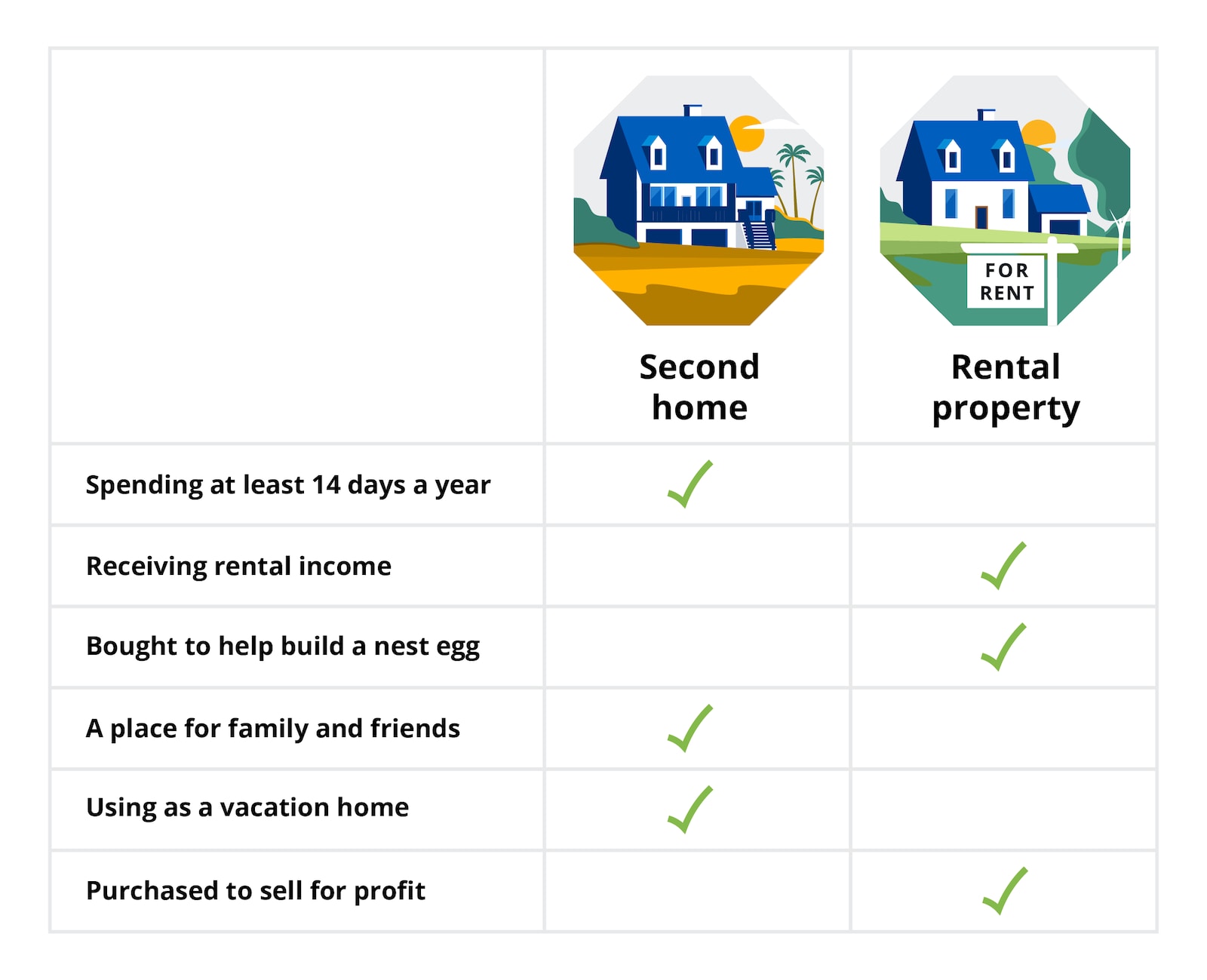
What are the different types of investment properties?
We've gone over what an investment property is, why people invest in them and the potential drawbacks. But what exactly do the properties look like? The short answer is that an investment property can look like a lot of things. The major types of real estate investment include:
Single-family homes
Single-family homes are popular in rural and suburban areas. They're a single housing unit (usually meant for one family to share) that sits on its own piece of land, without any structures attached to another housing unit. A single-family home often features multiple bedrooms and bathrooms with kitchen and living room areas meant for gathering.
Multi-unit properties
"Multi-unit" is an umbrella term for any residential or commercial property with more than one unit. This may be an apartment complex, office building or housing complex with townhouses. If you’re buying within a multi-unit property, you’re likely purchasing a condo or apartment unit.
Vacation homes
Although vacation homes often fall under second homes as opposed to the more traditional investment property, they can sometimes be considered an investment property. Some people buy investment properties in popular vacation destinations knowing there’s a relatively dependable rental market, and so that they can live in the home at certain points of the year as well.
Raw land
Buying raw land may be risky due to market fluctuations, financing and zoning regulations to name a few — but it is another potential medium for an investment property. You can either build a property on your land, rent the land out or hold onto the land and eventually sell it with the goal of generating a profit. It can be a good idea to speak with a real estate attorney before purchasing, renting or selling raw land.
Commercial properties
A commercial property is a large-scale piece of real estate purchased to run a business or generate profit. Depending on the type of commercial property and how you plan on operating it, you may need a small business loan instead of a mortgage.
Commercial investment properties explained
There is a difference between buying commercial real estate and renting it out, versus buying and operating a business within a commercial property. Buying a new business may have additional tax implications and regulations. If you're looking to learn more about how this might impact you, consult with a tax advisor. From a financing perspective, the business would typically be purchased with a business loan instead of a mortgage. Our focus here is the former, buying and renting out commercial real estate.
- Multi-family: If a multi-family property is owned and used by a company or an investor as a business or has more than five units, it would typically be considered a commercial property. If one person or a small group of people own and rent out four or fewer multi-family units, then it's likely considered a residential property.
- Office: Office buildings are a common type of commercial investment property. The owner typically invests in a building with office space that they rent out to other tenants.
- Retail: Retail commercial properties are establishments focused on selling goods and services. Some investors will purchase retail properties and rent them out to business owners.
- Industrial: Factories, warehouses, distribution centers and storage facilities are all examples of industrial commercial real estate. They're traditionally used for the production, distribution or storage of goods and services.
- Hospitality: Hospitality commercial real estate refers to almost any property that falls under the lodging, dining and event space. This includes hotels, bed and breakfasts, restaurants, bars and other venues.
- Mixed-use: A mixed-use commercial real estate property is a multi-functional space within one building or development. You'll typically find a residential property mixed with retail, hospitality or office spaces.
- Land: Land commercial property is unique in that it doesn't typically have buildings or structures on the property. The land is used and bought for the land itself. You'll typically use this land for agricultural purposes, like farming, mining or real estate development.
- Special purpose: Special purpose properties are reserved for specific purposes, such as a government building, a religious facility, a hospital or an educational building. Special purpose real estate can also be harder to rent out because the purpose of the property is limited.
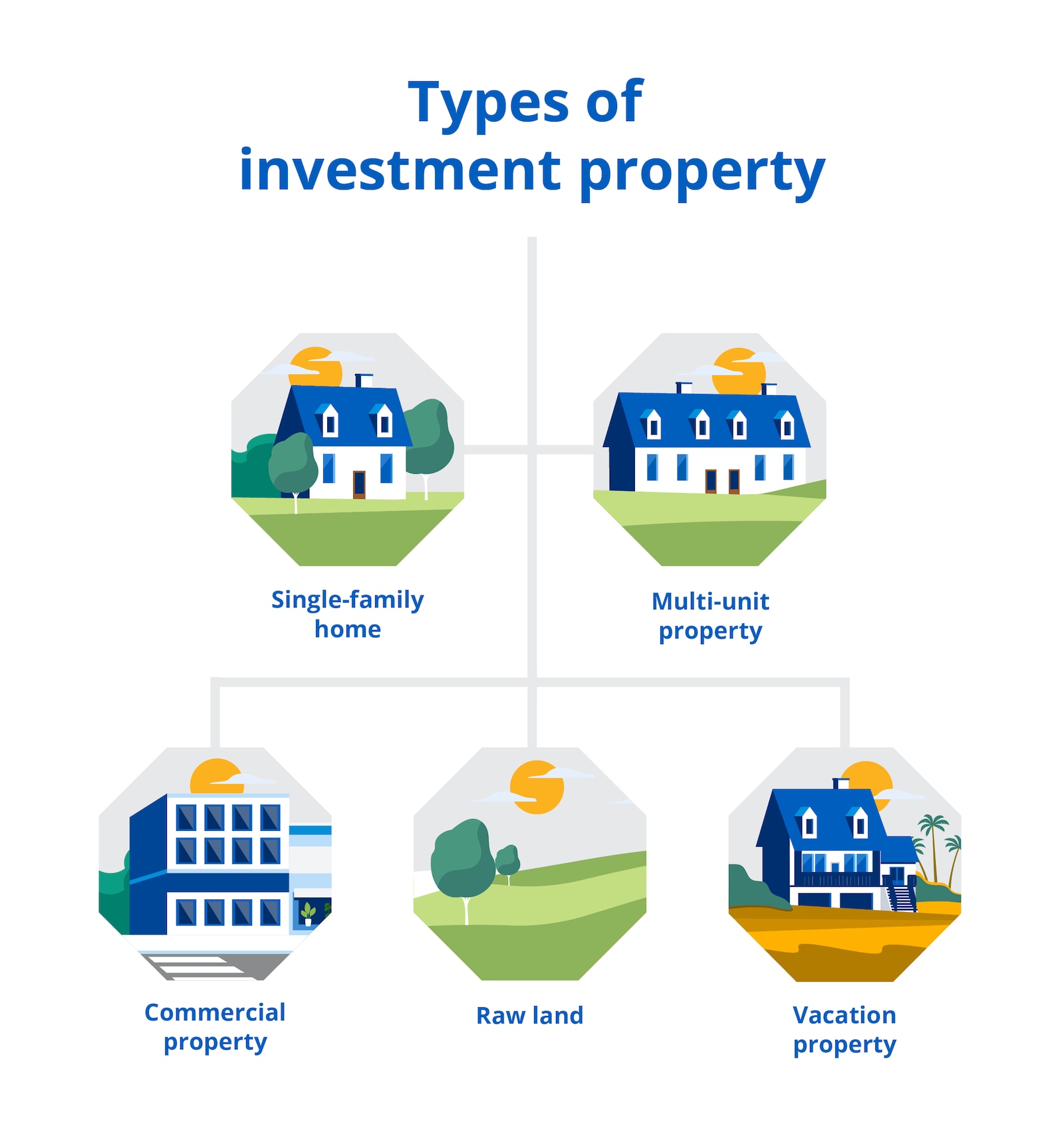
Is residential real estate a good investment?
While it's helpful to understand the role of commercial real estate, let's continue exploring the potential of investments in residential real estate. The primary reason people buy residential investment properties is for a potentially high return on investment (ROI) and potentially lower risk than certain other investments. The rental market is considered relatively steady, and real estate typically appreciates over time. There may be certain tax benefits that come with a real estate investment too. Overall, real estate may be a relatively dependable way to diversify your portfolio if you're able to comfortably finance the purchase.
Pro: Rental income
As mentioned earlier, rental income is one of the main perks of buying an investment property. At the beginning of your investment, rental income may help cover your mortgage payments. Depending on the market, it could potentially cover your monthly payments and then some, possibly even resulting in additional income. Once your mortgage is paid off, you'll be able to take fuller advantage of your rental income. You might put the money into savings, use it to improve your property, invest in another property or even invest it elsewhere.
Pro: Appreciation
Appreciation means an investment's value increases over time. Historically, real estate has been known to appreciate over time, though the housing market does fluctuate. If you buy an investment property, the general idea is that you'll potentially either own or operate this property for many years to come.
Pro: Tax benefits
As the owner of a rental property, there are certain rules surrounding reporting and returns you may benefit from. According to the IRS, all rental income must be reported on your tax return. Rental income is defined as any payment you receive for the use or occupancy of your property. At the same time, there are many deductions you may qualify for as the owner of a rental property. If you're looking to learn more about what tax benefits are relevant to you, consult a tax advisor. In the meantime, here are some examples:
- Mortgage interest
- Property taxes
- Advertising costs
- Maintenance and utilities
- Depreciation costs and repairs
Pro: Diversification
Diversification is the process of investing money in a few different places. Having several investments is generally considered to be a financially savvy strategy compared to putting all your eggs in one basket. If you decide to diversify your portfolio, it may be helpful to form a strategy — especially if you plan on making large investments that could have an impact on your financial future. As mentioned, real estate is typically considered a dependable strategy if you're looking to diversify your portfolio.
Pro: Control over your investment
Finally, people tend to buy investment properties because they have more control over the asset compared to other common types of investing. When you own a piece of property, you get to make decisions about what happens to it. If you're renting it out, for example, you have a say on the rental price, how the property is managed and how the property looks. With strategic renovations, you may even increase the value of your investment.
Pro: Remote investment property management
The rise of remote work and advanced telecommunications has had an interesting side effect on the investment property market. These new developments give investors more flexibility in traveling to seek new opportunities for investment, as well as the ability to manage those properties on their own schedule. Additionally, new technology makes it easier to market your property, ensure it stays occupied and stay in touch with property managers even in the further-flung corners of the world. All of this combined makes it more possible to invest and manage your property from the comfort of your own home.
Potential risks of owning an investment property
Like any investment, there are some potential risks of owning an investment or rental property.
Con: Vacancy rates
Vacancy rates refer to the percentage of available, unoccupied rental properties and are used to help landlords or investors understand the current rental market. Low vacancy rates typically correlate with a strong rental market because the demand for rental properties is high. A high vacancy rate means demand is low and investors may need to lower their rental price significantly, affecting your rental income stream.
Con: Down housing markets
Just like the economy, the housing and rental market ebbs and flows. In a down housing market, there may be some months — or even years — where business is slow and people aren't looking to rent or aren't willing to pay the price you may need. The value of your property may fluctuate during a down housing market as well.
Con: Dealing with repairs and maintenance
As the owner of a property, you're responsible for repairs and maintenance. If something breaks or your building needs work, it'll be up to you to find the right person for the job and, on top of that, cover the expenses. Depending on the size of your property and the extent of the issue, this may prove costly. Hiring a property manager to deal with repairs and maintenance may help save you time but adds another cost.
Con: Liability issues
A liability issue is when someone can be held legally accountable for damages. What's more, the cause of the damage may not always matter. As a landlord or property owner, it can be helpful to connect with a real estate attorney to identify the liability issues associated with a property:
- Personal injury: Landlords may be held responsible for injuries that take place on their property. For more information, please consult a legal professional.
- Lease violations: The world of property law can be complicated. Both tenants and landlords have their fair share of rights. A tenant may evoke their rights if they believe their landlord has violated the lease terms. A consultation with a legal professional may help you learn more.
- Property damage: Landlords may be liable for any form of damage done to their property, even if it is not done by them. Despite the tenant legally residing in a unit, the landlord is the owner of the property and is often held responsible for addressing property damages. To learn more, consider consulting a legal professional.
- Discrimination: Under fair housing laws, landlords are prevented from discriminating against tenants based on personal characteristics, such as race, sexual orientation, religion, disabilities and more. A legal professional may be able to provide additional information.
Con: Tenant management
As the owner and operator of a rental property, you're responsible for managing your tenants — unless you plan on hiring a property manager, which would cost money instead of time. Depending on your tenants and the number of units you own, tenant management may take up a lot of your time. You're responsible for interviewing potential tenants, troubleshooting issues and responding to maintenance requests, among many other responsibilities.
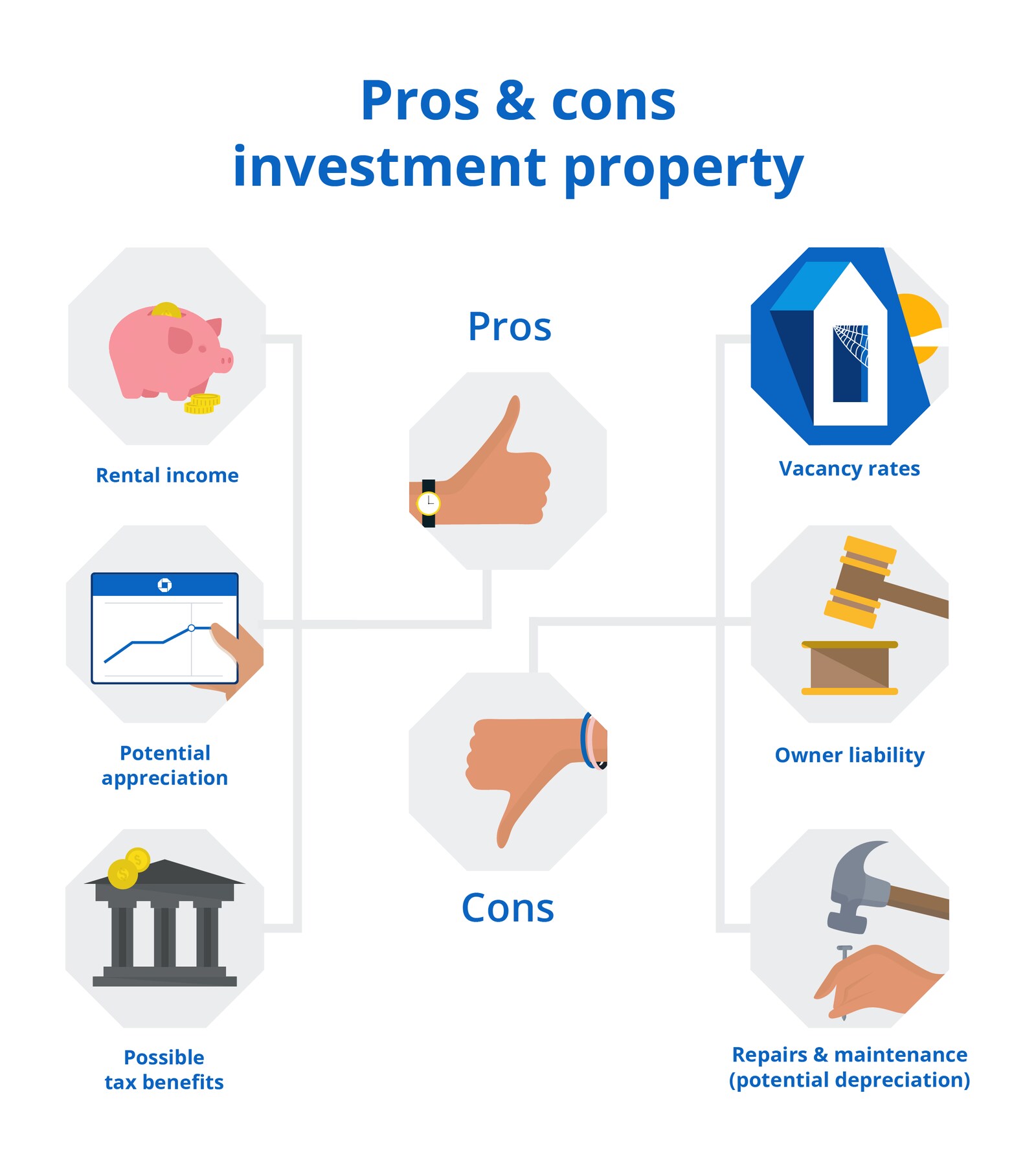
How do you find an investment property
Finding the right investment property will likely depend on what type of property you're looking to buy. Before embarking on this venture, you may want to assess how much money you can comfortably invest and what kind of features renters might want.
Outside of price, renters typically target a safe location, updated appliances, adequate square footage and specific amenities. For example, tenants living in a warmer climate might prefer a home with a swimming pool or a building with rooftop access.
There are websites that typically cater toward specific property types. Using online resources, you may be able to organize property viewings for yourself. If you find a property you like on your own, you may want to contact a real estate attorney to assist with negotiations and drawing up your offer.
If you don't find a property you like online, or you're looking for more help, you may want to start working with a real estate agent. Real estate agents have access to multiple listing services, which market homes you won't necessarily find on public domains. In addition, using a real estate agent may be especially worthwhile if you're looking to make a more complicated investment than say, a single-family home.
You can also network with other investors. You may be able to find local meetups, seminars or conferences for real estate investors that might provide you with more information and resources for your property hunt.
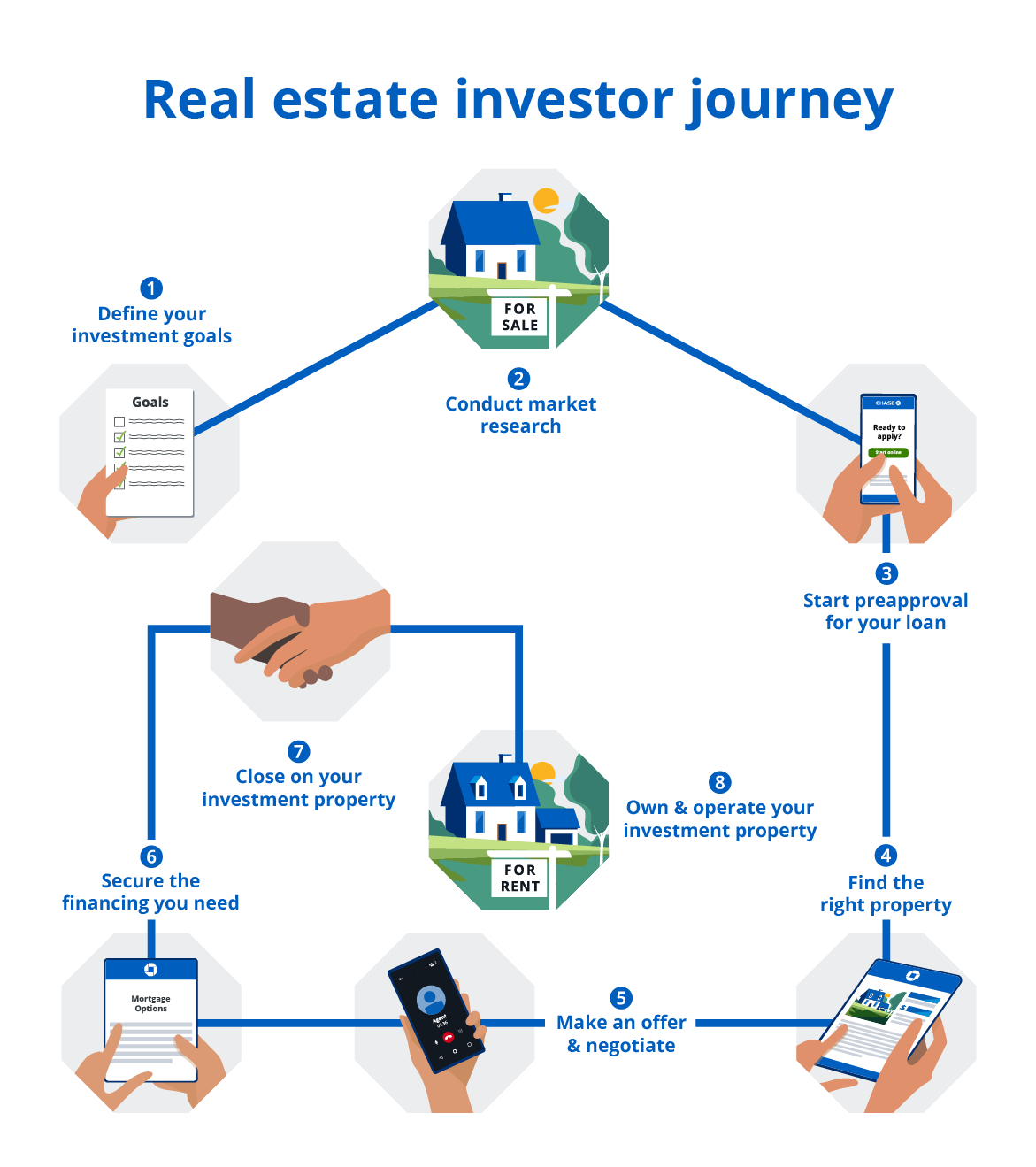
How do you buy an investment property
There are a few different loan products appropriate for an investment property. Because investment properties may carry more risk than primary residences, mortgage rates and lending requirements differ for investment properties vs. standard mortgage loans. If you’re not sure which loan is best for you, you may want to consider contacting a home lending advisor for more information.
Fixed- and adjustable-rate mortgages
A fixed-rate mortgage is a loan with a specific interest rate for the entire term. An adjustable-rate mortgage is the opposite. Your interest rate is subject to fluctuations once the introductory period is over. With a fixed-rate mortgage you’re often paying more upfront for the peace of mind that your rate won’t change. With adjustable-rate mortgages, you often get a lower introductory rate than a fixed-rate mortgage, but this is likely to change once the introductory period is over.
Conventional conforming mortgages
Conventional mortgages mean that they are not part of a specific government program, such as the Federal Housing Administration (FHA). They often cost less than FHA loans but may be more difficult to get. A conforming loan is a type of conventional mortgage. Conforming loans have maximum loan amounts that are set by the government.
Jumbo mortgages
Jumbo mortgages are large loans that exceed the maximum loan amount set by the Federal Housing Finance Agency (FHFA). They may be fixed-rate or adjustable-rate mortgages. Jumbo loans can be harder to qualify for and more costly than obtaining a conforming mortgage. If you qualify, you may be able to use a jumbo loan for an investment property.
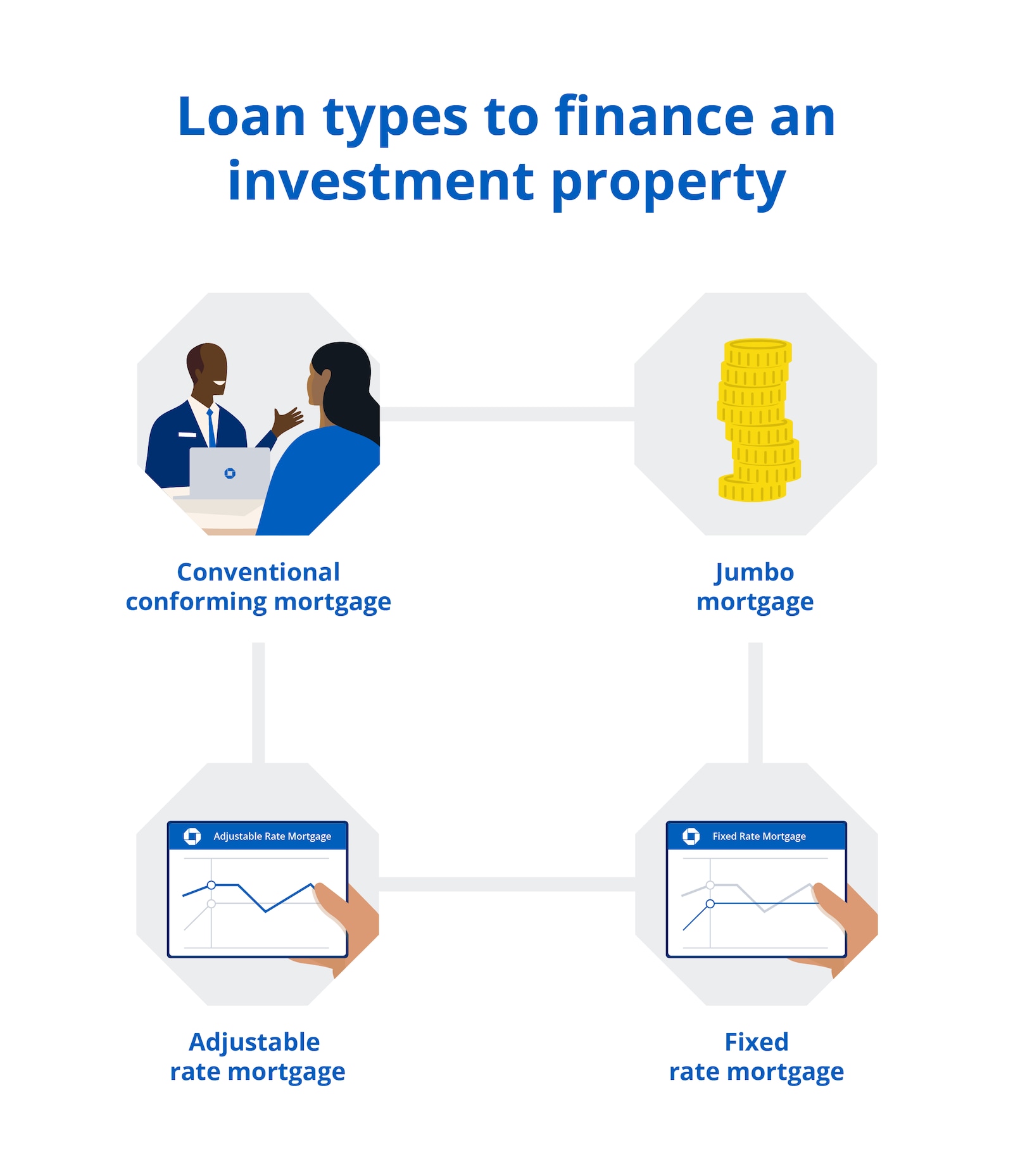
Resources and tools for buying an investment property
If you're interested in pursuing a real estate investment, here are some resources and tools that may help you on your way:
- Mortgage calculator with PMI, taxes and insurance: This tool can help you find loan options best suited to you. Simply plug in your property, or a property of interest, and customize your information to get estimated rates and monthly mortgage payments.
- Home value estimator: This home value estimator can help you understand a property's value and give insight on how to capitalize on your home's value with strategic insights to help inform your path forward.
- Guide to the right loan: This checklist can help you understand what mortgage is best for you. You can also find information about specific types of mortgages including fixed- and adjustable-rate, conventional conforming and jumbo mortgages.
- Chase MyHome: The Chase MyHome feature keeps details of your investments all in one place. You could use this feature to decide on an investment, complete mortgage applications and more.
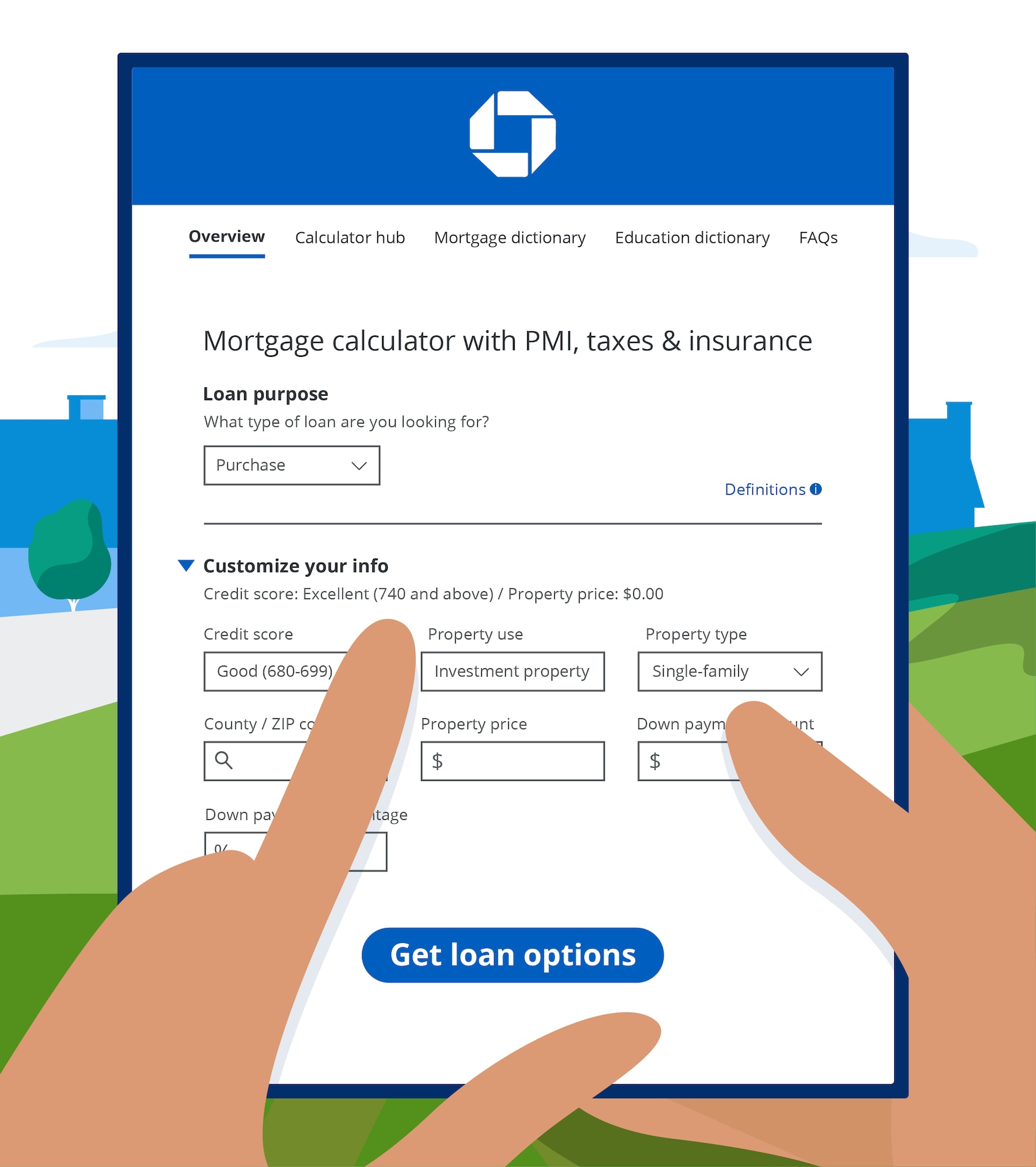
In summary
Investment properties are purchased with the goal of generating income through rental payments and property appreciation. Historically, real estate has been a dependable way to invest. Today, investing is made even more convenient due to advancements in listing services and property management. There are many ways to invest in real estate, and a good investment provides the opportunity for additional income. If you’re considering investing in a property, consulting a mortgage expert could be a helpful first step.